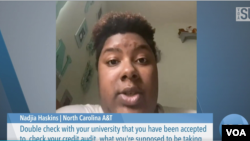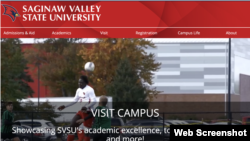Student Union
- By Ariel Hall
How to Be a College Freshman During a Pandemic

The beginning of the school year is anxiety-invoking enough, but add a global pandemic that changes all the rules, and students are scared and confused.
Incoming college freshmen who will enter a brand-new environment during a pandemic get a double dose. In addition to navigating the campus landscape, learning how to study for exams, and becoming familiar with college life, students will also have to adapt to social distancing and wearing a mask to help thwart the spread of COVID-19, the disease caused by the coronavirus.
Many say they feel lost and need guidance on how to take on college during the pandemic, which closed many campuses earlier this year and will open them only partially in a few weeks.
"My advice to incoming students is to come to campus with an open mind, fully prepared to step out of their comfort zone and ready to invest themselves in the college experience," Alphonso Garrett, director of admissions and recruitment at the University of Maryland Eastern Shore, wrote in an email to VOA.
"Although Fall 2020 may be a non-traditional semester in terms of student experience and class delivery due to social distancing, universities like UMES are completely dedicated to student success and satisfaction," Garrett wrote.
Nadjia Haskins, a rising sophomore studying bioengineering at North Carolina Agricultural and Technical State University, sent this advice to VOA for incoming freshmen: "Do as much research on your school as possible, because you could get there, and not like it. You might think it's great on paper or on the internet. But when you get there, chances are it's different, and you might not like it."
She also suggested that students double check their freshman course load to ensure it meets the direction of their degree path.
"Also, check what you're supposed to be taking as a freshman for your major, because if you don't know, then you don't know what classes to sign up for," she added.
Many schools have a degree/credit audit system that you can find online by going to your institution's website and logging in to your account.
Tuition and financial aid
"If you plan on going to college but you don't know if you have the funds for it, I recommend going towards a community college," advised Christian Gonzalez, an engineering student at the College of Southern Maryland. "It's a lot cheaper."
The average total cost of attendance at all four-year institutions was $32,595, compared with $15,766 to attend two-year schools, according to the National Center for Education Statistics for 2016-2017.
"Also, I would say stick with a full load of classes, form study groups which are very important for each class, visit your professors, and always pay attention to your syllabus," Gonzalez said.
"Because, when I gained the syllabus, I was able to time manage a lot better about where I can delegate my work and my time into study," he said.
Many colleges and universities offer student volunteers as peer advisers who work alongside admissions counselors to help new students adapt to the new environment.
Emma Sonnier, an orientation peer adviser and a student majoring in mathematics with an education minor at the University of Maryland, Baltimore County, has the following advice for students: "I would encourage incoming students, if they can, to live on campus because you'll at least get kind of used to what good independence is like."
"I think the second most important thing is just getting to know people, whether that be virtually or in person, like if you can go to classes in person, talk to the person that's six feet away from you, like, especially if you don't think you're going to be really good in that class," she said.
Another tip, Sonnier said, is to make connections on your campus "because it's so important."
"If you're indecisive of what you want to do in life, don't feel bad because, like, 80% of undergrad students will change their major. So, if you're, like, really confused about what to do, don't worry about it, basically everybody is," Sonnier said.
"An estimated 20 to 50 percent of students enter college as 'undecided' and an estimated 75 percent of students change their major at least once before graduation," author Virginia N. Gordon said in the book, "The Undecided College Student: An Academic and Career Advising Challenge" (Second Edition).
Leyla Middleton, a rising junior majoring in biology at Morgan State University in Baltimore, told VOA: "Don't go to college thinking you're invincible. Things can and will happen to you and those around you. But, I just finished my sophomore year, and coming in as a freshman, I would've never thought any of the experiences I've had would've happened to me or people around me."
Also, bring a TV, Middleton said, "especially if you're not the type of person who likes to go out" to parties and large social gatherings.
"I wish I would've known before I started college that it's not as hard as people make it to be," said Micayla Minnis, a student studying psychology with a business minor at Towson University in Maryland. "If you keep up with your work and manage your time well, then you will succeed."
Staying in control
A recent HuffPost article put it succinctly, suggesting students keep an "old school" calendar, be resilient, have a regular routine, be self-aware, ask for feedback, and use mistakes as learning opportunities.
"Also, one thing that every student should bring to school is a storage container with a lock so that you can keep your stuff locked up," like laptops, money and food, "because I've know people who've had their personal items stolen."
Many upperclassmen have taken to social media to advise new college students.
"My advice for college freshmen moving away from home is to never let your roommates try to dictate your life and the choices you are allowed to make! you're allowed to mess up and figure out who you are! don't let somebody else control your mental health!" @RiopelleJordyn tweeted on May 24.
A study by Virginia Commonwealth University in 2019 found that students' use of alcohol was influenced most by the drinking habits of their peers, including the greater college community, and not just their roommate or others in the dorm.
@MonroeRebekah tweeted this tip for freshmen on May 21: "My advice for college freshmen: ALWAYS WRITE DOWN YOUR FAFSA PASSWORD WHERE YOU CAN FIND IT AGAIN."
FAFSA refers to the Free Application for Federal Student Aid (FAFSA), a form that college students use to apply for financial aid.
See all News Updates of the Day
International students navigate financial challenges to pay US tuition

Navigating the complexities of higher education is challenging for many, but for international students, the financial hurdles can be particularly daunting.
Faced with skyrocketing tuition and fees, limited access to financial aid, and the instability of scholarships, many international students struggle to sustain their academic dreams.
Funding problems can lead some students to withdraw their college applications, as Alpha Daramy Sesay of Sierra Leone did. He abandoned his dream of studying journalism at the University of Maryland.
"I've applied to almost three universities in the past two years, and the board members were thrilled with my purpose statement and approved my application unambiguously," Sesay told VOA News. "However, I was unable to register due to the funding bottleneck, and the deadline for these offers has just lapsed."
Sesay had meticulously planned his move to the U.S., even stopping his scholarship search when a family member promised financial support. When Sesay was admitted to his dream school, however, the family support fell through, leaving him scrambling for scholarships that didn't cover all expenses.
Reflecting on his ordeal, Sesay advises future international students to seek scholarships and consult with school advisers early to avoid similar setbacks.
Talia Popovski, senior director of International Student Services at Valencia College in Orlando, Florida, suggests starting at a community college to save on tuition costs.
"Primarily, we have international students pursuing associate degrees," she said. "This is a major way for them to save money compared to going directly to a university."
Popovski emphasized the benefits of community colleges as pathways to universities, with many international students pursuing associate degrees before transferring to earn their bachelor's degrees. She also highlighted the role of on-campus work in alleviating financial burdens, suggesting institutional work-study programs as options.
According to NAFSA: Association of International Educators, a nonprofit dedicated to international education and exchange, international students are ineligible for federal work-study positions, necessitating discussions with advisers about employment eligibility. Popovski also mentioned that universities offer part-time jobs through their human resources departments, including paid internships, which provide additional financial support for education.
Student secures honor scholarship
Guilherme Lucas Mannarino, who received his associate degree from Valencia College, turned down 32 esports scholarships to study in Florida.
"I came to the United States [from Brazil] when I was 18 years old," Mannarino recalled. "I rejected all the scholarships that I acquired through esports, playing Fortnite."
Mannarino, who majored in finance at Valencia College, exemplified proactive planning in overcoming financial challenges.
Despite declining the esports scholarships, Mannarino secured an honor scholarship at Valencia College covering 50% of his tuition. He attributed his financial stability to planning ahead, staying on top of his academics, and acquiring an on-campus job.
To supplement his income, he conducted workshops advising Brazilian students on esports scholarships, allowing him to cover living expenses by finding roommates through social media.
"I was able to find a roommate on social media before coming to the U.S., which is a great way to save money," he said. "A year later, we had another roommate, which made my living costs cheaper, which is honestly the best way to save money in the U.S."
Tips for overcoming financial hurdles
Kadiatou Sow, from Conakry, Guinea, is studying at Saginaw Valley State University in University Center, Michigan.
"Managing the high cost of tuition and living expenses while studying abroad involves a strategic approach," Sow said. "I prioritize securing scholarships and grants tailored for international students to alleviate tuition expenses and sometimes cover living costs. Supplementing this with part-time work both on campus and in the local community provides a steady income for daily necessities."
She encourages fellow international students to balance work and studies effectively, understand visa work-hour regulations, and seek university support for financial aid options.
"Seeking guidance from university support services and staying informed about financial aid options are essential strategies for navigating these challenges successfully," Sow said.
Three ways international students can overcome financial hurdles:
1. Community college enrollment: Begin with an associate degree at a community college to save significantly on tuition costs before transferring to a university for a bachelor's degree.
2. On-campus employment: Explore institutional work-study programs and university job boards for part-time employment opportunities that complement studies and provide financial support.
3. Proactive financial planning: Save money before arriving in the U.S., seek scholarships tailored for international students, and explore paid internship opportunities to supplement income.
While financial obstacles are daunting, international students can achieve their academic aspirations through strategic planning, diligent scholarship pursuit and leveraging on-campus resources, advisers say.
By adopting proactive financial strategies and staying resilient, they can successfully navigate the challenges of financing their education abroad, ensuring a path to academic success and personal growth.
- By VOA News
Indian newspaper offers tips for US-bound students

Telangana Today, a newspaper in India, offers a list of tips and resources for students planning to study in the United States.
Among them:
- Prepare for your travel to the U.S., making sure to gather all necessary documents, including your passport and visa.
- Be sure to attend orientations.
- By VOA News
Michigan State international students get their own space

Michigan State University in East Lansing, Michigan, is setting aside a space in the International Center for international students.
Nidal Dajani, vice president of the school's International Student Association, said that the club plans to use the space to host events and hopes to collaborate with other student groups.
- By Dylan Ebs
International students find community during Pride Month

For LGBTQ+ international students, Pride Month, observed in June, is a unique time to reflect.
They hold on to multiple identities — both their LGBTQ+ identity and their cultural background — but coming to terms with them is not always easy.
For graduate student David Zhou, these identities can feel conflicting as transgender rights in China remain a controversial issue and spaces for LGBTQ people close. Zhou, 25, is transgender and pursuing an education in the STEM field at an urban university in the Midwestern United States.
VOA is using a pseudonym for Zhou’s first name and is not naming his university to protect his identity due to safety concerns back home in China. Zhou is not open about his transgender identity to his family.
During Pride Month, Zhou said he attended multiple LGBTQ+ events in his community and is surrounded by a supportive group of LGBTQ+ students who can relate to his experiences. But he’s not open about his identity to everyone on campus and said he doesn’t disclose his preferred pronouns to everyone to avoid transphobic comments.
“I feel like I have to make some judgments of the character of that person to see if they’re a good person to disclose [my identity] to,” Zhou said.
Zhou’s Pride Month celebrations included attending local markets with LGBTQ+ vendors and hanging out with his LGBTQ+ friends.
“They normalized being trans and for a long time I feel like trans identity is, should I say a vulnerability, brings me fear and worrying about discrimination, but having those events are helpful because it allowed me to see that queer people could just [live] openly,” he said.
At social events where few international students are present, Zhou said it can be tough to fit in.
“There's a lot of times like when they were talking about things I kind of, don't really understand, mostly because I kind of lack some background experience or knowledge,” he said.
Zhou said he is not aware of specific groups for LGBTQ+ international students at his university, but said international students are more prevalent in graduate programs and therefore find representation in organizations for LGBTQ+ graduate students.
In China, transgender individuals must obtain consent from an “immediate family member,” even for adults hoping to transition, which critics say limits the autonomy of transgender individuals while supporters say the policy protects doctors from violence by upset parents.
Struby Struble, a former coordinator of the University of Missouri LGBTQ+ Resource Center, told NAFSA: Association of International Educators in 2015 that LGBTQ+ international students face a “double barrier” on campus.
“With their international student friends, they feel isolated because they’re the LGBT one,” she said. “But then among the LGBT students on campus, they feel isolated because they’re the international one.”
Nick Martin, associate director of the Q Center, Binghamton University’s LGBTQ+ student support office, said when international students tour the center, there’s often a sense of hesitation as they enter a type of space that may not be present in their home country.
“I compare that to a year in after they've come into the space, they've again, maybe come to some of our events, they've got more connected,” he said.
Martin said graduate students have a unique interest in the Q Center as they may use the office for research and advocacy purposes that align with their studies.
“For older students, there may be hesitancy in a different way, but I think it's more in the vein of they want to do some of the advocacy work,” he said.
Martin said he thinks about how both his office and BU’s international student office can support students who come from countries with few — if any — protections for LGBTQ+ individuals.
“It's been a learning process of what those students really need, but I think I've kind of learned that a lot of students are just looking for the safe space that we offer,” Martin said.
- By VOA News
International students discuss US campus culture shock

International students at De Anza College in Cupertino, California, talked about culture shock in an article in La Voz News, the student newspaper.
"It felt like a major culture shock. Everything was so different, from academics to mannerism," said a student from Mexico.
Read the full story here.










